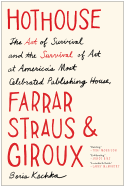
In Hothouse, New York magazine contributing editor Boris Kachka offers a spirited and well-informed history of one of the country's most distinguished publishing houses: Farrar, Straus & Giroux. For future students of the publishing business in the second half of the 20th century, this smart, unsentimental portrait will be essential reading.
Roger W. Straus, Jr., the scion of two prominent German-Jewish families, "could be cheap, vulgar, classist, and sexist all in one gratuitously cruel remark," all while holding himself out as an "aristocrat of taste in a mercenary meritocracy." From T.S. Eliot to Flannery O'Connor to Isaac Bashevis Singer, FSG attracted a roster of literary superstars (including 25 Nobel laureates), nurturing them both creatively and financially. For all his character flaws, recounted in exquisite detail, Straus was the force of nature who kept these writers in the FSG fold and made it the home of choice for contemporary authors like Jonathan Franzen and Jeffrey Eugenides.
Much of Hothouse chronicles the financial challenges that faced the house since its founding in 1946. Kachka also dishes plenty of gossipy fare about the illicit couplings at 19 Union Square West, a cramped warren of offices dismissed by Straus's wife, Dorothea, as a "sexual sewer," alongside stories of Straus's feuds and friendships with industry insiders.
Somehow, as Kachka describes it, over the nearly six decades Roger Straus was the dominant player at FSG, he created a culture that was "high-minded and scrappy, aggressive and refined, quintessentially American but thoroughly international." How he balanced on that high wire for so long makes a lively and entertaining story any book lover will devour with relish. --Harvey Freedenberg

